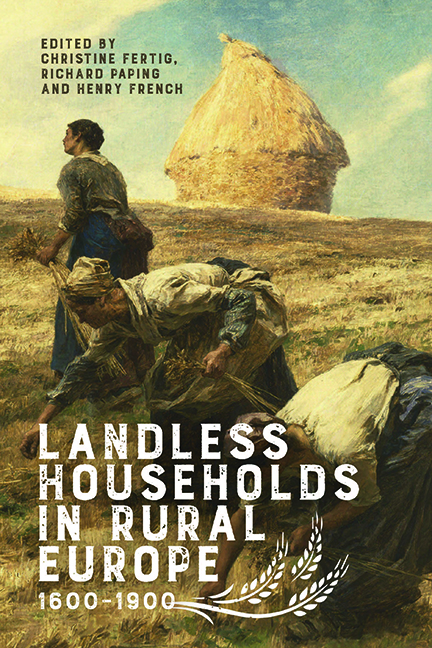Book contents
- Frontmatter
- Contents
- List of Illustrations
- Notes on Contributors
- Preface
- Introduction
- 1 The Treballadors of Girona: Evidence of the Emergence of Wage Labour in Early Modern Catalonia in the Sixteenth and Seventeenth Centuries
- 2 The Squatter Economy of the English Countryside: Building New Landless Communities in England, c. 1600–1900
- 3 The Rise of Landless Households in the Dutch Countryside, c. 1600–1900
- 4 ‘Gaining Ground’ in Flanders after the 1840s: Access to Land and the Coping Mechanisms of Landless and Semi-Landless Households, c. 1850–1900
- 5 Strategies of Survival, Landlessness and Forest Settlement in Flanders: The Forest of Houthulst in a Changing Landscape of Survival (c. 1500–1900)
- 6 Landless and Pauper Households in England, c. 1760–1835: A Comparison of Two Southern English Rural Communities
- 7 Landless Rural Households in France, 1852–1910
- 8 Survival in a Hostile Agrarian Regime: Landless and Semi-Landless Households in Seventeenth-Century Sweden and Finland
- 9 Farming Craftsmen? Access to Land and the Socio-Economic Position of Rural Artisans in Early Modern Finland
- 10 Landlessness and Marriage Restrictions: Tyrol and Vorarlberg in the Eighteenth and Nineteenth Centuries
- 11 Cottages, Barns and Bake Houses: Landless Rural Households in North-Western Germany in the Eighteenth Century
- Bibliography
- Index
- Boydell Studies in Rural History
11 - Cottages, Barns and Bake Houses: Landless Rural Households in North-Western Germany in the Eighteenth Century
Published online by Cambridge University Press: 08 October 2022
- Frontmatter
- Contents
- List of Illustrations
- Notes on Contributors
- Preface
- Introduction
- 1 The Treballadors of Girona: Evidence of the Emergence of Wage Labour in Early Modern Catalonia in the Sixteenth and Seventeenth Centuries
- 2 The Squatter Economy of the English Countryside: Building New Landless Communities in England, c. 1600–1900
- 3 The Rise of Landless Households in the Dutch Countryside, c. 1600–1900
- 4 ‘Gaining Ground’ in Flanders after the 1840s: Access to Land and the Coping Mechanisms of Landless and Semi-Landless Households, c. 1850–1900
- 5 Strategies of Survival, Landlessness and Forest Settlement in Flanders: The Forest of Houthulst in a Changing Landscape of Survival (c. 1500–1900)
- 6 Landless and Pauper Households in England, c. 1760–1835: A Comparison of Two Southern English Rural Communities
- 7 Landless Rural Households in France, 1852–1910
- 8 Survival in a Hostile Agrarian Regime: Landless and Semi-Landless Households in Seventeenth-Century Sweden and Finland
- 9 Farming Craftsmen? Access to Land and the Socio-Economic Position of Rural Artisans in Early Modern Finland
- 10 Landlessness and Marriage Restrictions: Tyrol and Vorarlberg in the Eighteenth and Nineteenth Centuries
- 11 Cottages, Barns and Bake Houses: Landless Rural Households in North-Western Germany in the Eighteenth Century
- Bibliography
- Index
- Boydell Studies in Rural History
Summary
In the eighteenth century, an increasing proportion of rural households in north-western Germany had little or no access to landed property. While the population grew, and the impartible inheritance system left many young people without access to landed property, more and more families established themselves as renters of farms or house owners. In some regions, rental agreements included limited access to land, while in other regions, there is no evidence that these families were provided with land or given access to the commons. In this chapter, these families will be called ‘renters’: they lived in their own households; therefore ‘lodger’ would be a misleading term; and since only some of them also leased land, but others did not, ‘tenant’ would not be appropriate, either. It will be demonstrated that German rural society experienced different types of integration of landless families into local communities.
So far, these landless families have gained only little attention within historical scholarship. The chapter will first give a brief overview of the available literature on landless families in north-western Germany. Then the first results of a larger project on the landless and land-poor population in a north-western German region (Münsterland) will be presented. The chapter will focus on the prevalence of landless households in different regions, discuss the relations between landless and landowning social classes and explore the place of landless households in eighteenth-century rural society.
The alleged lack of interest in the non-peasant part of the rural population may in part be explained by the notion of the countryside as a ‘peasant society’, strongly promoted by nineteenth-century scholars like Wilhelm Heinrich Riehl, one of the founders of folklore studies or, as we call it today, cultural anthropology. For a long time, peasants and rural society as a whole were considered as a bulwark against modernisation, as a stable and constant force of persistence. The dynamics of a changing countryside, with vital industries and an ever-growing population of non-peasants, did not fit this image. In the late nineteenth century, however, modern reformers and early social scientists discovered the rural labouring classes. The Verein für Socialpolitik, an association of reformers, scientists, officials, industrialists and landowners, initiated an investigation of the social situation of agricultural workers, as an important part of addressing the social conditions of workers. Max Weber was one of the main researchers and wrote a detailed report on rural labourers in Eastern Prussia.
- Type
- Chapter
- Information
- Landless Households in Rural Europe, 1600-1900 , pp. 270 - 292Publisher: Boydell & BrewerPrint publication year: 2022



